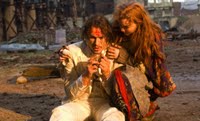
It's been about a week since I saw The Imaginarium of Doctor Parnassus. Over the course of this week, I have almost entirely lost my mental grasp on the world of the movie. It was so overloaded with stimuli, so awash in hallucinogenic imagery, and so random and fanciful that I can't call back the feelings that it evoked. Maybe this is the type of thing you just can't hold onto... a world that exists only within the space of the movie, and can't subsist anywhere else. This is a world that vanishes, even from the memories of the viewers who experienced it.
The sheer randomness of the movie actually lost me at times, creating empty enigmas and blasting me with discordant imagery. For a while, I was actually a bit irritated at the total lack of cohesion that I saw as the only unifying element to the narrative. I've chilled out on that, though... a fair number of critics (like Mr. Ebert) were willing to forgive it, and even I was able, almost right from the start, to excuse these narrative excesses and oversights in favor of an uncontrollable directorial vision.
In looking back, though, I've realized that I've seen this world before. Even as it slips from my memory, it's registered something, recalling another movie I only remember in fragments. This is Gilliam's previous phantasmagoric sideshow, The Adventures of Baron Munchausen, and the more I think about it, the more I'm sure of it: these two films took place in the same universe.
So what happens in this universe? What kind of a bizarre, dwarf-populated, uninhibited place is it? Well, first, it's a place where the Earth and the cosmos are built on non sequitor and whimsy. It's a universe that only exists because its story is being told, as the young Parnassus so kindly informs us, and thus it's a world defined by its storytellers and reenactors. It's a world where powerful ideas manifest, whether they're personifications, like the King of the Moon and Vulcan the Fire God, or the living sparks of confused imaginations, like the inner worlds of Parnassus's mirror. It's a shared world, but at any one time, it issues forth from the voice of its storyteller, like a tree growing from a seed. It's a world that can be saved from war and ruin by the Baron's ability to tell a tale with a happy ending.
This is a world divided into the common people, a naive and unruly lot, and the heroes, the redeemers of daily life. These commoners are well-meaning, but just tend to get themselves into trouble, whether by falling prey to Tony's empty promises, or by shouting down the Baron himself. It's always a world on its way to ruin, sinking inevitably into normalcy, but generally barely held aloft by the heroic efforts of its heroes and hopefuls, who lift it up by its own bootstraps, even as they fight off their own inner demons.
Interestingly, this is also a world of singular beautiful women, the radiant centers of their universes. Whether they're Roman goddesses or flirty daughters of immortal drunkards, they're inevitably impossible to contain, and they always seem to become the stakes in showdowns between supernatural powers. Venus, played by a noticably naked Uma Thurman, pioneered this role, catalyzing the rivalry between the Baron and Vulcan. However, Valentina, played by Lily Cole, took the archetype to a new level. Her love was not only a point of contention between Anton the rascal and Tony the undead con man, but between her father and the devil himself.
I often wonder about the strange process that results in a half-formed world within the imagination of a culture. These worlds... the world of Pulp Fiction and Reservoir Dogs, the world of 2046 and In the Mood for Love and Chungking Express, the world of With Honors and Good Will Hunting (I'm convinced that all three of these constitute self-contained worlds)... these are mysterious and robust, and in their incompleteness, they seem almost more complete than our confusing, disorderly everyday universe.
To these we can now add the world of Baron Munchausen and Doctor Parnassus... a harlequin universe of mythical figures engaged in cryptic games of life and death... and it's a universe that will keep growing, because its story is still being told.

1 comment:
Congrats on being "Writer of the Day" over at Blogcritics!
Post a Comment